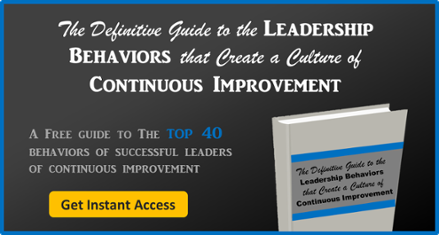 Managers, executives, and board members say they want to create improvement and change processes that produce sustainable results. Often, they are willing to spend some money to have that happen. Too often, however, it doesn't succeed.
Managers, executives, and board members say they want to create improvement and change processes that produce sustainable results. Often, they are willing to spend some money to have that happen. Too often, however, it doesn't succeed.
There are many times in our "non-business" lives that we want to build something for the long term, something that will last. On those occasions we behave differently, with planning and purpose. What if we didn't? What if we took the same approach we often take as managers at work?
For example, if I want my daughter to grow up with a strong character, with a focus and an understanding of the importance of a solid education, do I write her a note one day and then forget about it? Well, not if I really expect her to take my thinking to heart.
No, a note won't do it. I must be there with her to talk through her experiences and, as often as possible, to experience her experiences! Why then would things be different at work? Why would anyone expect that a single email or memo to staff would cause major change to take place?
And, even if some positive change does somehow occur, how could we think it will last? How will it be sustained?
Perhaps influencing the life of a young person is too strong of an example.
Instead, let's consider the game of golf. Most even "semi-serious" golfers practice regularly. They head to the driving range to get experience with one important aspect of the game, making a long drive. In addition, they visit a putting green regularly to firm up their short putt skills and they watch golf on TV to get clues from the pros when they aren't actually playing the game themselves.
My point here is, in that part of their lives, people seem to understand that practice, follow-up, and observation is required to improve, to change and to have improvement endure.
Improvement and change at work requires those same elements. Leaders who point to the new direction the organization needs to take, but then resume business as usual, should not be surprised at the lack of success. Improvement and change, like any important strategy, must be examined, must be fed, and must be recognized if it is to have any chance of being sustained. We must avoid thinking of lasting progress as something where we can say "hey, that's a great idea, let's do that for the next 5 minutes or 5 months and then forget it forever."
So where do we start?
It’s important to start somewhere that you can look back on as a turning point… somewhere where the organization as a whole can see as obvious. To me, that means determining where the organization is right now. It means undertaking a “big picture” assessment that serves two purposes:
- It provides a snapshot in time (here’s where we were when we started) and
- It creates a business case for change
To demonstrate the importance of the assessment, leadership must be serious, thorough, inclusive, transparent and timely as they appoint and charge a cross-organizational group to produce an easy to understand, data-based assessment.
Using existing reports and studies, this report on the current condition of the organization would examine areas such as:
- Customer Service/Patient Satisfaction
- Clinical Quality
- Financial Status
- Operational Status
- Market Share & Competition
- Employee Satisfaction
- Physician Satisfaction
- Community Support
Once completed, this assessment report must be shared and discussed with the entire organization – the board of directors, the medical staff, and the employee staff. Everyone needs to understand the starting point for coming changes, as well as why change is necessary.
Now, with the assessment completed and communicated, we can start to develop a detailed plan that meets the needs of the organization.



Add a Comment